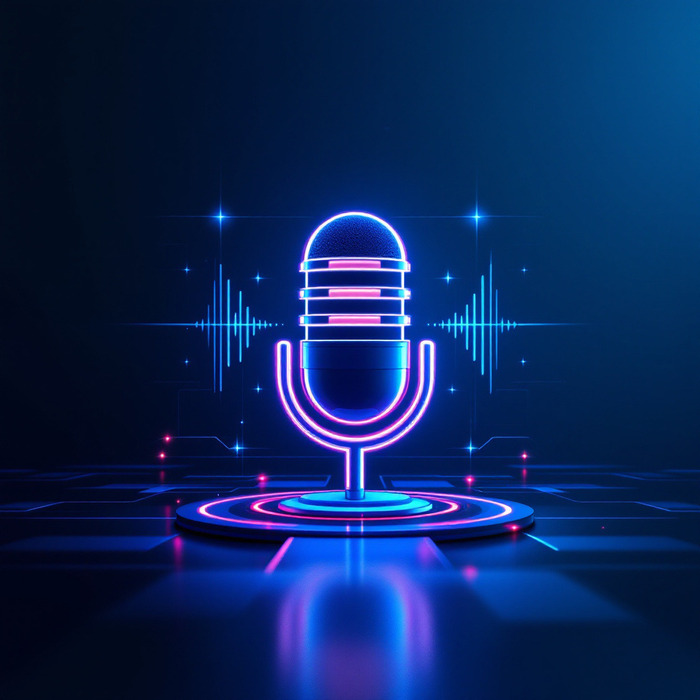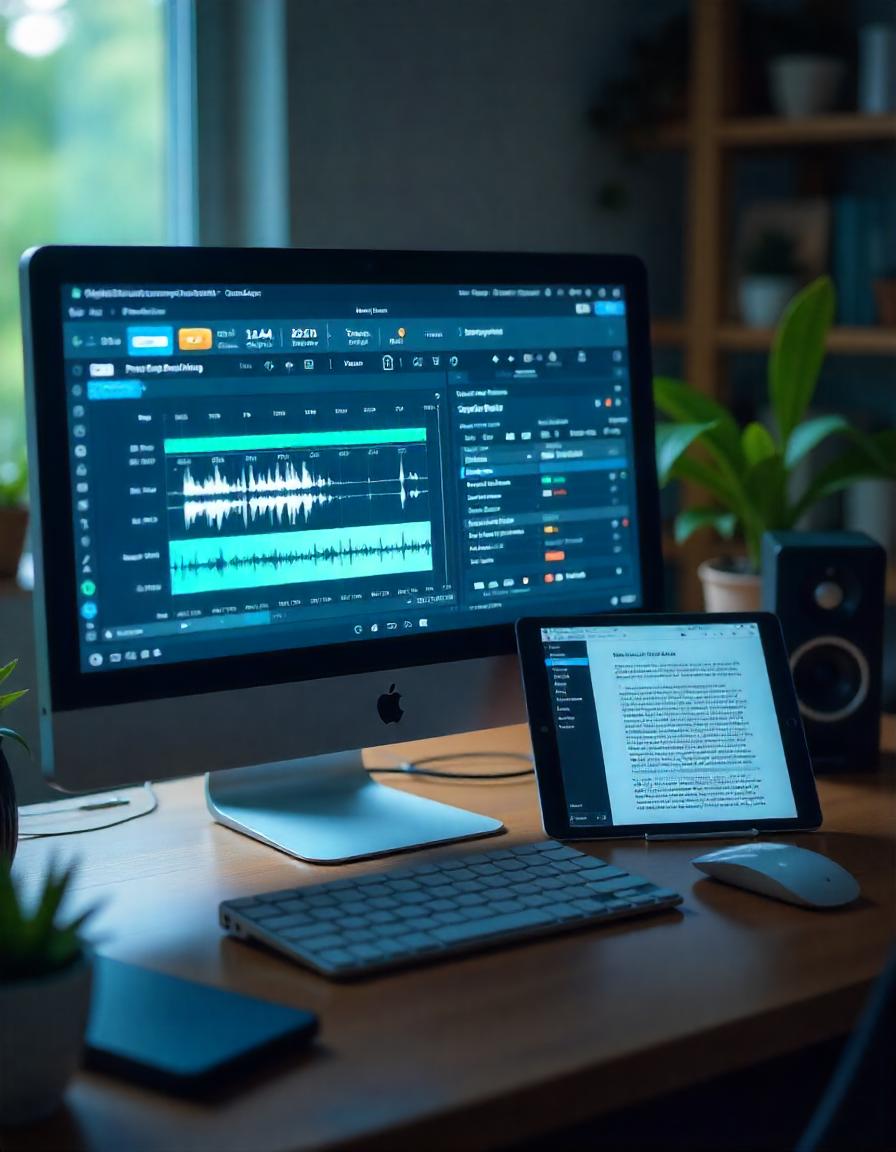
Wondering how to create audiobooks with AI voice generation? Here’s a simple guide that shows you exactly how to turn your book into an audiobook – no fancy studio needed!
AI voice generation for audiobooks is changing how we share stories. Books that would’ve taken weeks to record in studios can now be made right at home. Writers and publishers are jumping into the audiobook world without breaking the bank, using simple tools that turn text into real-sounding voices.
Here’s the thing about AI voice technology – it’s made turning books into audiobooks super easy. Remember how complicated it used to be? Now you just pop your book into the software, play around with different voices until you find one that feels right, and you’re off. Got a part that doesn’t sound quite right? Just change it right there and then. No more dealing with expensive recording studios or trying to schedule voice actors. It’s kind of like having your own little recording studio, minus all the hassle
More and more people are finding out about AI voice generators for audiobooks. Small publishers are making their first audiobooks. Self-published authors who couldn’t afford voice actors are getting their stories heard. Even big publishers are trying it out because it’s faster and costs way less than traditional recording.
Want to dive deeper into the world of AI audiobooks? Listen to our podcast for an in-depth discussion!

I. The Rise of AI in Audiobook Creation
A New Era for Audiobooks
The audiobook world is exploding right now. You know how everyone’s always got those earbuds in? Well, a lot of them are listening to books. It’s gotten so big that by 2030, people will spend about $35 billion on audiobooks. That’s wild, right? But it makes sense – folks are busy, and listening to a book while doing other stuff just works better for many of us.
This is happening at the perfect time, actually. AI voice generation just jumped in and made it super easy to turn books into audiobooks. Before, a lot of amazing books never made it to audio because it cost too much. Now? Writers can make their audiobooks without emptying their bank accounts.
The old way of making audiobooks kept a lot of great books from reaching listeners. Many writers couldn’t afford to turn their books into audio. But now, AI audiobook creation is opening doors for everyone who wants to share their stories through audio.
Traditional Methods vs. AI Innovation
Think about how people used to make audiobooks before AI came along. Writers had to find the perfect voice actor, someone who could bring their characters to life. Then they needed to rent a professional studio, which could cost hundreds of dollars per day. Even a short book could take weeks to record. And if they found mistakes? They’d have to go back to the studio and record everything again.
AI voice technology has completely changed this process. Now, writers can sit at their computer, open an AI voice generator, and start turning their books into audio right away. They can pick from different voices, make adjustments on the fly, and fix any issues without starting over. It’s not just faster – it’s also way more affordable.
What AI Brings to Audiobook Creation
The really exciting thing about using AI for audiobooks is how it’s leveling the playing field. Independent authors who could never afford traditional audiobook production can now reach listeners everywhere. Small publishers can experiment with different genres without risking their whole budget on one book.
But it’s not just about saving money. These AI voice tools are getting better all the time. They can handle different accents, add emotional touches to the narration, and even deal with tricky words or names. Plus, writers can try different voices for different characters, making their stories more interesting to listen to.
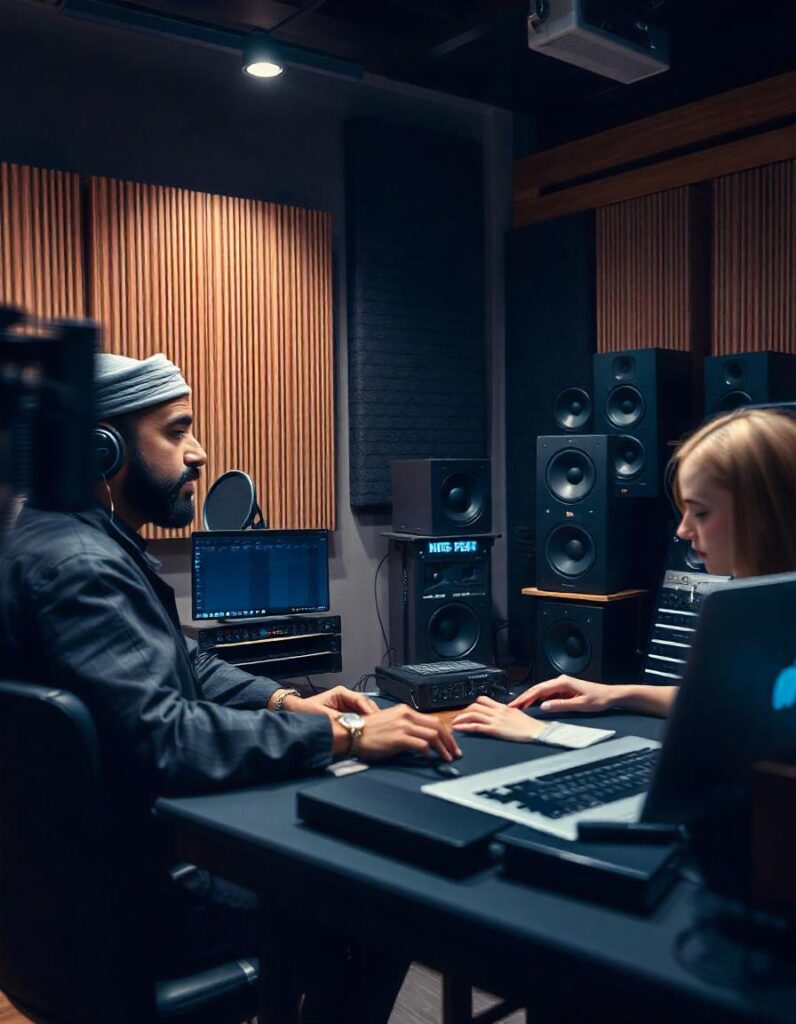
II. How AI Audiobook Technology Works
Understanding Text-to-Speech Technology
AI text to speech works in a pretty cool way. Think of it like teaching a computer how to read out loud. The computer looks at your book’s text and figures out how each word should sound. It’s not just reading word by word – it actually understands things like when to pause, how to say questions, and where to put emphasis.
Over time, these AI voice generators have gotten really good at sounding natural. They’ve learned from thousands of hours of real people talking, so they know how to make sentences flow together smoothly. They can even pick up on things like whether something’s supposed to be exciting or serious.
Tools and Platforms Available Today
So what can you actually use to make your audiobook? Let me tell you about some real game-changers. Murf.ai is one that a lot of people love. It’s like having a recording studio on your laptop – just way simpler.
Lovo AI is another good one. Lots of folks use it because it makes the voices sound really natural. Then there’s Play.ht, which is great if you’ve got a longer book.
Want something different? Check out VoiceoverMaker or Speak AI. Each one has its own thing going for it – some are better for stories, others work great for how-to books or business stuff.
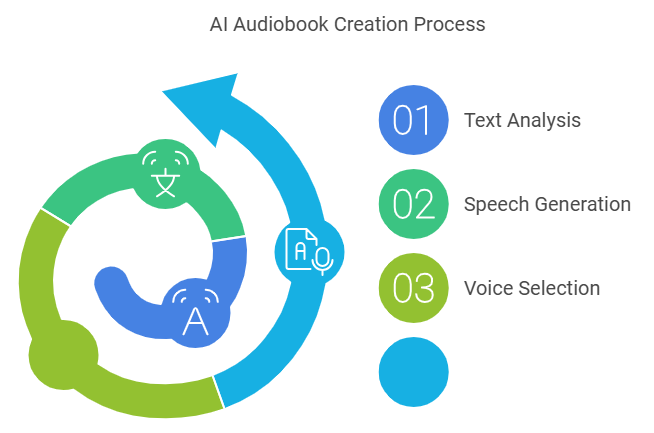
Picking a Voice That Fits
Here’s the fun part – choosing your narrator’s voice. Think about it like casting an actor for a movie. You wouldn’t want someone who sounds like they’re reading the news to narrate your romance novel, right? Or a super peppy voice reading a serious history book.
Take your time trying out different voices. Most of these tools let you test them out before you commit. You might be surprised at how different your book can feel with different voices. Some writers even say they discovered new things about their stories just by hearing them in different voices.
You can pick things like:
- How fast or slow the voice reads
- Whether it’s a male or female voice
- What kind of accent it has
- How old the voice sounds
- The tone and style of speaking
Voice Cloning: The Newest Thing
Here’s something really interesting – some AI voice technology can now copy real human voices. This means if you have a specific voice in mind, you might be able to create something that sounds similar. Some authors are even using their own voices as the base for their audiobook narration.
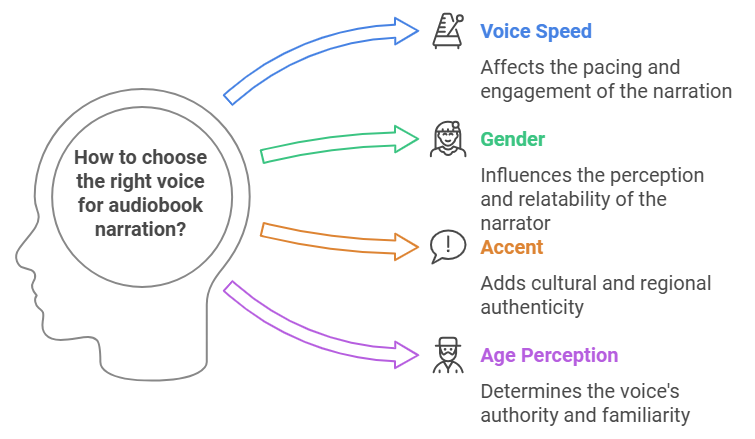
III. How to Make Your AI Audiobook Sound Great
Getting Your Book Ready
Before you start making your AI audiobook, you need to get your text in good shape. It’s like giving the AI clear instructions so it knows exactly what to do. Clean up your text file first – make sure all the spelling is right and your punctuation makes sense. This helps the AI voice know when to pause and how to say things correctly.
Making Your AI Voice Sound Natural
The magic of making a good AI audiobook happens when you tweak how the voice sounds. These text to speech tools let you control all sorts of things. You can make the voice slow down for important parts, or speed up for exciting scenes. You can even add pauses where you want listeners to have a moment to think.
Adding Feeling to Your Audiobook
Nobody wants to listen to a robot reading a book. That’s why good AI voice generation tools let you add emotion to the narration. You can make your narrator sound happy in the fun parts, serious in the dramatic scenes, or gentle during quiet moments. It’s all about making the listening experience feel real.
Making Everything Sound Clean
Clean audio is super important for audiobooks. Most AI audiobook software comes with tools to help make everything sound crystal clear. You can:
- Get rid of any background noise
- Make sure the volume stays the same throughout
- Fix any weird-sounding parts
- Make the narrator’s voice sound rich and full
Adding Music and Sound Effects
Some books sound even better with a little extra touch. You might want to add:
- Gentle background music between chapters
- Soft sound effects for certain scenes
- Different music for different parts of the book
Checking Everything One Last Time
Before you finish your AI audiobook, you need to listen to the whole thing carefully. Check for:
- Words that don’t sound quite right
- Places where the pauses feel off
- Any spots where the emotion doesn’t match
- Parts that might need different voices
Best AI Voice Tools for Your Audiobook
When it comes to making your AI audiobook, you’ve got some really good options. Let’s look at some of the most popular tools:
Murf.ai is great if you’re just starting out. It’s super easy to use and has lots of natural-sounding voices. You can try different voices until you find one that fits your book perfectly.
For something a bit different, check out Lovo AI. They’ve got some really lifelike voices, and you can add emotion to make your audiobook more interesting to listen to.
Play.ht is another solid choice. It’s good for longer books because it handles big files well, and their voices sound really natural.
If you want lots of options, try VoiceoverMaker. They’ve got tons of different voices to choose from, so you can find exactly what you’re looking for.
Speak AI is worth checking out too. They’re newer, but they’re doing some cool stuff with making AI voices sound super natural.
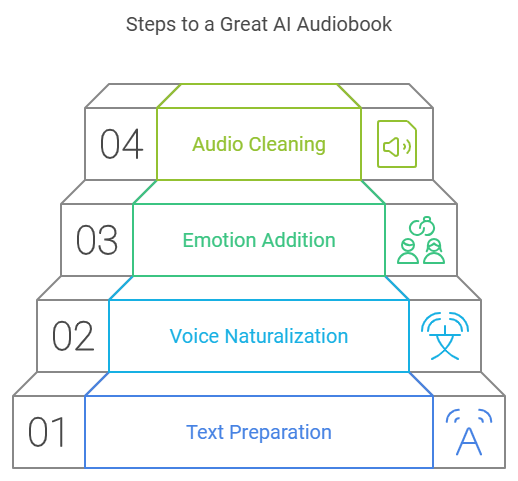
IV. Getting Your AI Audiobook Out There
Current Challenges in Distribution
Right now, getting your AI narrated audiobook onto some platforms can be tricky. Big names like Audible (ACX) aren’t accepting AI-voiced books yet. But don’t worry – there are plenty of other good places to sell your audiobook.
Where You Can Sell Your AI Audiobook
Google Play Books is really open to AI audiobooks. They even have their own AI voices you can use. It’s a huge platform with lots of listeners, so it’s a great place to start.
Rakuten Kobo is another good option. They just ask you to mention that your book uses an AI narrator. This is good for listeners too – they know exactly what they’re getting.
You can also sell your audiobook right from your own website. Lots of authors use sites like:
- Shopify to handle payments
- BookFunnel to deliver the audiobooks
- Payhip for direct sales
Keeping Up with Changes
The cool thing is that more platforms are starting to accept AI voice generation audiobooks. Apple Books is testing out their own AI narration tools. This means we’ll probably see more places open up to AI audiobooks soon.
Some tips for staying ahead:
- Keep an eye on platform policies
- Join author groups where people share updates
- Check audiobook news sites regularly
- Follow the big platforms on social media for announcements
Marketing Your AI Audiobook
Just because your book uses an AI narrator doesn’t mean you can’t market it like any other audiobook. Focus on:
- How professional it sounds
- The story or information you’re sharing
- The listening experience
- Your book’s unique selling points
Many listeners care more about the content than whether it’s an AI or human voice. Some even prefer AI narration because it’s so consistent throughout the whole book.
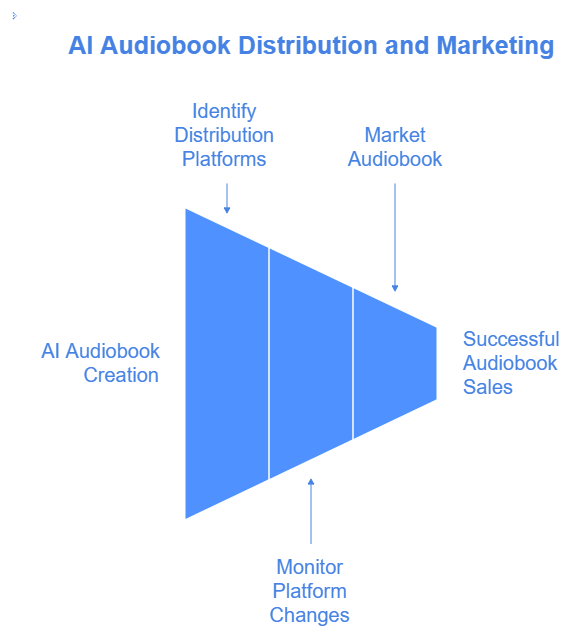
V. Important Things to Think About When Using AI Voices
Being Open About AI Use
It’s really important to tell listeners when you’re using an AI voice generator for your audiobook. This isn’t about making excuses – it’s about being honest with your audience. Most listeners are totally fine with AI narration as long as they know about it upfront. Add a clear note in your audiobook description and maybe a short mention at the start of the book.
What This Means for Voice Actors
AI voice technology isn’t here to replace human narrators. Think of it more like giving writers another choice. Some books work great with AI voices, while others still need that special human touch. Many voice actors are now working with AI companies, helping make the voices sound better and more natural. They’re also finding new work in areas where AI just can’t compete, like complex character voices or highly emotional scenes.
Making Sure AI Voices Work for Everyone
We need to make sure AI audiobook creation works well for all kinds of books and all kinds of listeners. Right now, some AI voices might not handle certain accents or languages as well as others. Companies making these tools are working hard to include more diverse voices and better handle different ways of speaking.
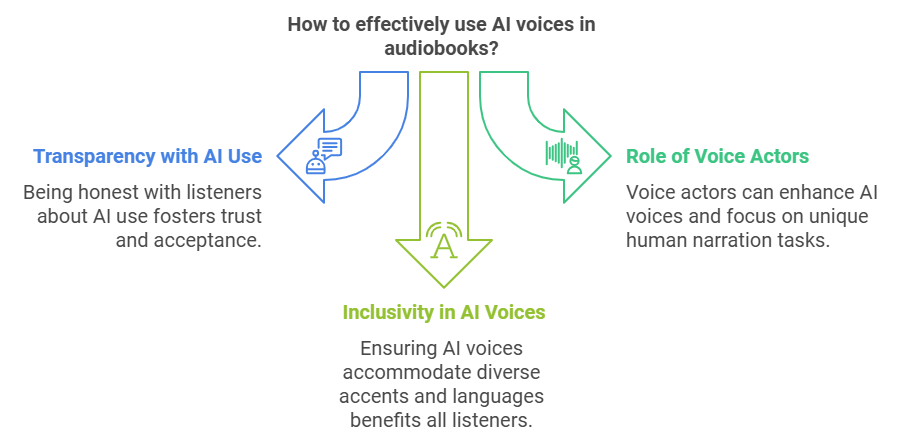
VI. What’s Coming Next for AI Audiobooks
Better Technology
AI voice generation keeps getting better and better. The newest tools can make voices that sound almost exactly like real people. They’re getting better at:
- Adding natural emotion to the narration
- Handling different languages and accents
- Making the reading flow more smoothly
- Understanding context better
Interactive Audiobooks
Some really cool stuff is starting to happen with AI audiobooks. Imagine books that:
- Let listeners choose different voices for characters
- Change the story based on what listeners pick
- Add sound effects that match what’s happening
- Learn what each listener likes and adjusts to it
AI and Human Narrators Working Together
The future might not be just AI or just human narrators. Instead, we’re seeing interesting ways they can work together:
- AI helping human narrators practice
- Tools that mix AI and human voices
- AI handling basic narration while humans do character voices
- New ways to edit and improve recordings
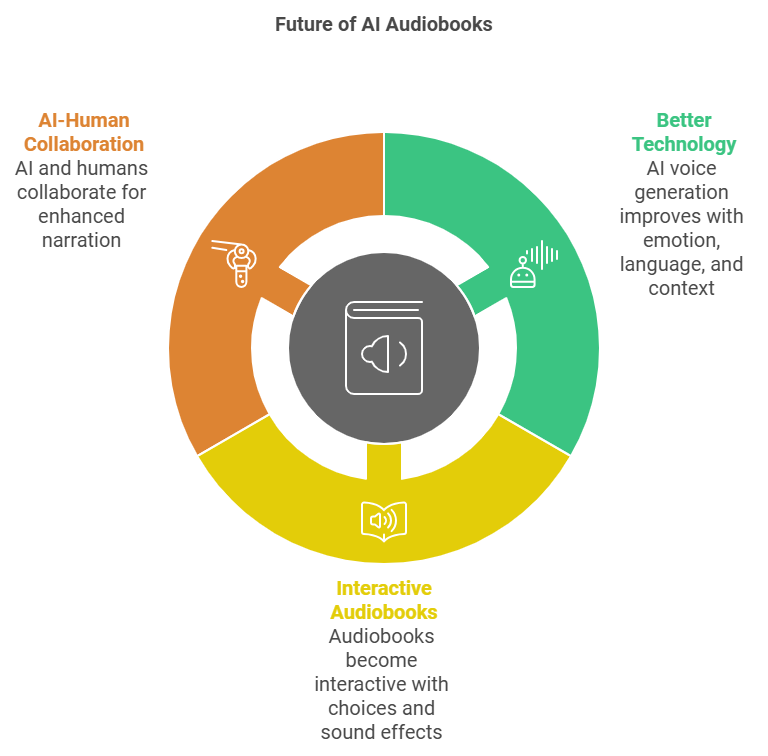
VII. Looking to the Future of AI Audiobooks
What’s Working and What Isn’t
AI voice generation has really shaken things up in the audiobook world. Think about it – now anyone can make an audiobook without spending a fortune. Writers who could never afford to make audiobooks before are getting their stories out there. And if something doesn’t sound right? They can fix it in minutes, not weeks.
Sure, there are some rough spots. AI voices aren’t perfect yet. Sometimes they mess up words or don’t catch the feeling of a scene just right. And yeah, some audiobook stores aren’t ready to sell AI-made books yet. But these problems are getting smaller every day as the technology gets better.
Making Smart Choices with AI
Being straight with listeners is super important. Just tell them upfront that you’re using an AI narrator. Most people are cool with it – they just want to know what they’re getting. And make sure your book actually sounds good before you put it out there. Bad audio is bad audio, whether it’s AI or human.
The good news? Listeners care way more about the story than who’s telling it. If your book is good and the AI voice is clear, people will listen.
What’s Coming Next
Here’s what’s really cool – we’re just seeing the start of what AI audiobooks can do. Pretty soon, we might have:
- AI voices that sound just like real people
- Books where you can pick different voices for different characters
- Ways to make the story change based on what listeners want
- Tools that make every book sound perfect
Will AI take over all audiobooks? Probably not. But it’s giving more people a chance to be heard. And that’s what really matters – getting more stories out into the world.
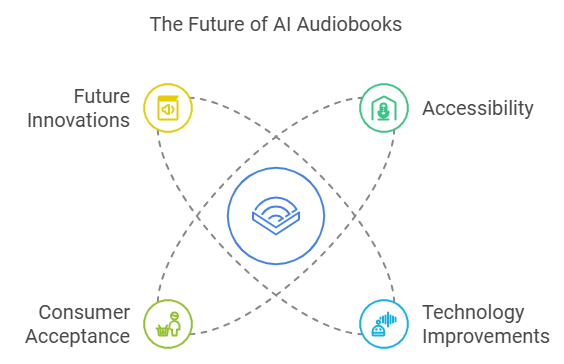
FAQ’S about How To Creat Audiobooks with AI Voice Generation
Can I use AI to generate an audiobook I authored?
You bet! Making your book into an audiobook with AI is totally doable these days. Think of it like having a professional narrator, but without the huge price tag. You just take your book, pick a voice you like, and let the AI do its thing. A bunch of writers are doing this now because it’s quick and won’t break the bank.
How does AI voice generation work for audiobooks?
It’s pretty cool, actually. The AI reads your book kind of like a really smart person would. It knows when to pause at commas, how to ask questions, and even how to put feeling into different parts. You can pick different voices, change how fast they talk, and even make them sound excited or serious depending on what’s happening in your book.
Will AI replace human narrators in audiobooks?
Probably not! Think of AI more like another tool in the toolbox, not a replacement for human narrators. Some books work great with AI voices – like textbooks or how-to guides. But other times, you really need that human touch, especially for things like children’s books or complex stories with lots of characters. It’s kind of like having both instant coffee and a fancy coffee machine – each has its place!
What are the benefits of using AI for audiobook production?
AI offers several advantages over traditional methods, including:
- Cost-Effectiveness: Reduces the need for hiring voice actors and renting studio space.
- Speed: Allows for rapid generation of audio content, enabling quicker turnaround times.
- Customization: Offers a wide range of voice options and styles tailored to different genres and audiences
What tools are available for creating audiobooks with AI?
There are numerous AI tools designed for audiobook production, such as:
- Murf AI: Offers over 130 voices across various languages with customization features like pitch and emphasis.
- Genny by Lovo AI: Allows users to select from 400+ voices and provides options for emotional tone control.
- Natural Reader: A free tool that enables users to create audiobooks from text easily
How do I prepare my manuscript for AI narration?
To ensure optimal results when using AI for narration, consider the following steps:
- Edit your manuscript thoroughly to ensure clarity.
- Use formatting techniques (like quotation marks) to indicate dialogue.
- Test the text with a sample narration to catch any awkward phrases or mispronunciations before finalizing
- Resources:
- https://publishdrive.com/ai-audiobook-narration-for-ebooks.html
- https://fliki.ai/use-cases/content-creation/audiobook-creator
- https://blog.reedsy.com/guide/audiobooks/ai-narration/
- https://ghostwritersandco.com/how-to-create-audiobook-ai/

